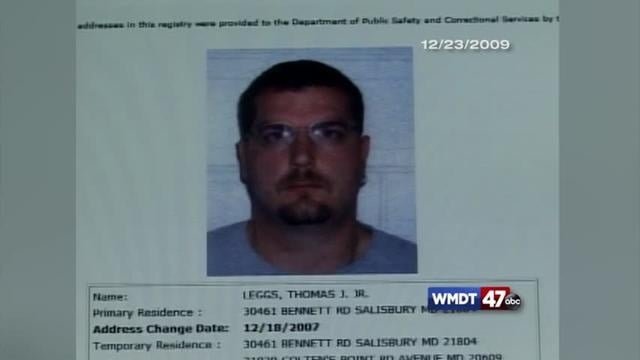Prosecuting repeat sex offenders

Prosecutors in Maryland are working together to change a state law. Currently, sex offenders on trial cannot have previous convictions brought up in that trial. House Bill 218 if passed, would change that.
State’s Attorney for Wicomico County Matt Maciarello testified in front of a judiciary committee earlier this month, citing a case dating back to 2009. The case of 11 year old Sarah Foxwell, who went missing on December 23, 2009. Two days later, on Christmas day, her body was found with signs pointing to murder. Although it was over 6 years ago, Sarah’s story still resonates with many residents on the Eastern Shore because of the massive search, that ended in heartache.
Maciarello is using this painful tale, in the hope of enacting change. He says that sex offenders have a peculiar disposition to commit these crimes over and over again.
Sarah was the victim of Thomas Leggs, who at the time was the boyfriend of the 11 year old’s aunt. Leggs was previously convicted of sexual offense crimes three times, one of which includes a sexual offense against a minor.
Martin Fisher is a Detective Sergeant with the Wicomico County Sheriff’s office, as well as an administrator at the Salisbury Child Advocacy Center. He was there when Foxwell’s body was found, and says he is constantly thinking of all of the “what if’s” of the case. He goes on to allude that Sarah Foxwell may have been with us today had Legg’s previous trials gone differently.
Which brings us back to house Bill 218. The legislation is now under judicial review in the Maryland State House. The bill is mirrored after a federal law that was enacted in 1994. House Bill 218 uses similar language, but narrows the scope. The federal law uses vague terminology that leaves some parts up for interpretation. House Bill 218 gives the judge a clear process to follow when deciding if prior convictions should be brought forth. It is a two pronged test: first, is there clear and convincing evidence to show that the defendant did in fact commit the previous crime. The second part, does the relevant evidence outweigh any prejudice that may come from allowing the evidence.
47ABC spoke with defense attorney Luke Rommel about the bill. He says that everyone is entitled to a presumption of innocence, and just because there may be prior convictions, does not mean that you are necessarily guilty at the time of the trial. Cases of sexual offense are admittedly not Rommel’s focus, however he says that the legislation would be a fair change. He cites the narrow scope of the bill as a reason he supports it, as well as the fact that in the end allowing the evidence is at the Judge’s discretion.
47ABC is told that sexual offense cases are often one person’s word against the other, and it becomes very hard to prove one side right. Supporters of this bill say allowing the use of prior convictions, would allow another voice to that debate.
There is no current timeline for the judicial review, however once the committee agrees on the wording, it will then go before the House and Senate where it is up to State legislators to vote.

